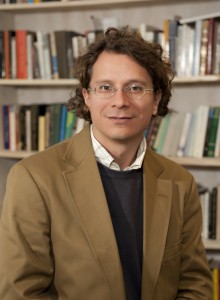The University of Florida Religion Department is excited to welcome our newest faculty member, Dr. Jonathan Edelmann. Dr. Edelmann will be joining our faculty focusing on Religions of Asia. He comes to us most recently from Mississippi State University.
He will serve as Assistant Professor of Hinduism, Department of Religion, at the University of Florida. Beyond his post with #UFreligion, he is an editor for the International Journal of Hindu Studies and author of Hindu Theology and Biology with Oxford University Press, which won a John Templeton Foundation Award. Edelmann was a fellow with the American Academy of Religion for two years, held a Post-doctoral fellowship with Harris Manchester College, Oxford University, and was a Shackouls Honors College Faculty Fellow and Assistant Professor of Religion at Mississippi State University.
His research is on the Bhāgavata Purāṇa, an important source of culture, fine arts, philosophy, theology, and narrative in South Asia. He conducts research on the Gauḍīya Vaiṣṇava interpretation of the Bhāgavata Purāṇa and related texts such as the Bhagavad Gītā and Upaniṣads. Edelmann is also interested in the manner in which Hindu thought might respond constructively to contemporary issues in the philosophy, with a special focus on issues of rationality and epistemology, philosophies of science, ecology, and conceptions of nature. He teaches in two areas: Religions of Asia and Religion and Nature, often emphasizing the philosophical underpinnings of religious traditions, especially with regard to conceptions of self, religious practice, and ultimate reality. He has published in a wide variety of leading academic journals in Religious Studies, Consciousness Studies, and Indology, for example the Journal of the American Academy of Religion, the Journal of Consciousness Studies, Zygon: Journal of Science and Religion, and the Journal of the American Oriental Society.
Dr. Vasudha Narayanan of #UFreligion had this to say about Dr. Edelmann joining the faculty:
We are very excited to have Professor Edelmann join us in our department. He is a well-known scholar who has published in all the major journals in our field. He not only adds to the existing strengths in the department by building bridges between many of our existing tracks but brings in new areas of interest. Trained in classical languages and texts at Oxford, he is also a scholar of religion and science, and will be able to add to our repertoire of undergraduate and graduate courses.
#UFreligion was able to interview Dr. Edelmann asking questions about his personal and professional life. Here is that conversation:
Why did you go into religious studies in the first place?

Who was the single most influential person in your preparation for this career? Why?
Where did you graduate from? What’s one fond memory you have of your graduate student career?
I earned a Ph.D. from Oxford University in 2008. I have so many fond memories of Oxford, a medieval and modern city, and an amazing university with near unlimited intellectual, cultural, religious, social and historical resources. I relished the quiet moments in Oxford’s many beautiful libraries, surround by books, fellow students, dons, and the rich history and culture that filled the spaces and sustained the university for almost 1000 years. I miss the conversations with other graduate students about our work, however obscure or unusual, in my College (Harris Manchester), at the Oxford Center for Hindu Studies, at lunches, in cafés, pubs, and common rooms. I miss gleaning decades of learning from faculty in tutorials, at garden parties in subfusc, or while briskly walking to a lecture.
What are your present/future research plans?
What drew you to UF’s program?
What are you most excited about in coming to UF/Gainesville?
I am most looking forward to having a community of scholars with whom I share common intellectual interests and goals. I was impressed that all students take “The Good Life” as incoming freshmen, that the libraries are so well maintained, and that there are essential academic resources like museums and research centers that focus on specific areas of study. I am glad that the arts and humanities thrive inside the university and in the town of Gainesville as well.
What challenges have you faced, and what do you consider to be the most significant challenges facing the academic study of religion?
What are the promises and opportunities in the field?
What have you enjoyed most about your experience as a researcher and professor in the field of religious studies?
What is one book you would recommend to anyone interested in religious studies?
I think the Bhagavad Gita still stands as one of the most interesting and comprehensive reflections on the nature of human religious experience. It explores a great number of ethical, metaphysical, social, and psychological issues. It has been read for centuries. It raises questions about life that we still reflect on today.
What is something most people probably would not know about you?
I spent a transformative spring and summer backpacking in Wyoming after high school and still go back there when I am able.
What do you think of alligators? Any preference for alligator encounters? Why or why not? 🙂